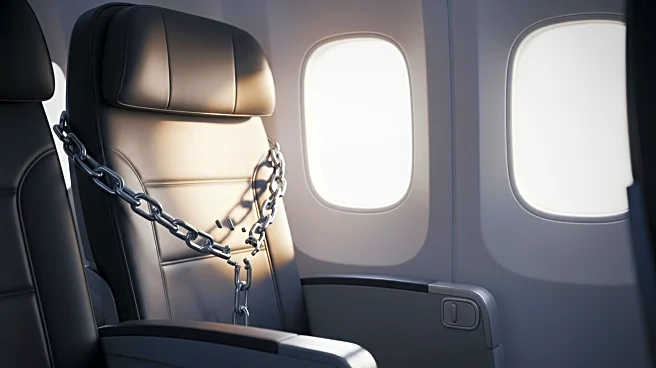What's Happening?
A passenger involved in a viral TikTok video incident on a Southwest Airlines flight has filed a lawsuit against the airline and her attacker. The altercation occurred when Leanna Perry, an intoxicated passenger, assaulted Livia Rombola during a flight from New York to Kansas City. Perry was seen in the video pulling Rombola's hair and shouting abusive remarks. The lawsuit claims that Southwest's open seating policy contributed to the confrontation, as Perry rejected an open seat near another passenger, which was an early red flag ignored by the airline staff. The lawsuit argues that the lack of assigned seating exposes passengers to potential conflicts. Southwest plans to implement assigned seating in January 2026, but the current policy remains a point of contention.
Why It's Important?
The lawsuit against Southwest Airlines highlights the ongoing issue of passenger safety and airline policies. The open seating arrangement, which is unique to Southwest, is criticized for potentially leading to conflicts among passengers. This case underscores the need for airlines to reassess their seating policies to ensure passenger safety and comfort. The incident also reflects broader concerns about unruly passenger behavior, which has been a significant issue for airlines, especially during the pandemic. The outcome of this lawsuit could influence industry standards and prompt other airlines to reconsider their seating arrangements.
What's Next?
Southwest Airlines is scheduled to implement assigned seating in January 2026, which may address some of the concerns raised in the lawsuit. The legal proceedings will likely explore the extent to which the airline's seating policy contributed to the incident. The case could set a precedent for how airlines manage passenger seating and handle conflicts. Stakeholders, including other airlines and consumer advocacy groups, will be watching closely to see if this leads to changes in industry practices.
Beyond the Headlines
The incident raises questions about the balance between operational efficiency and passenger safety in airline policies. Southwest's open seating policy is designed to streamline boarding and reduce turnaround times, but it may inadvertently increase the risk of passenger altercations. The case also highlights the impact of social media on personal privacy and reputation, as the viral nature of the incident has led to significant attention and stigma for those involved.










